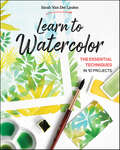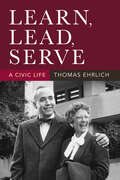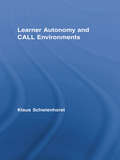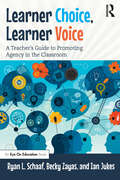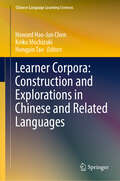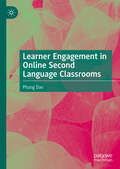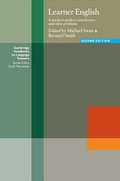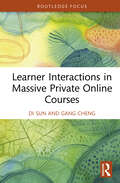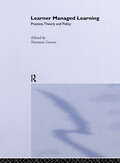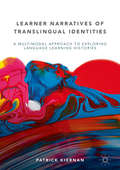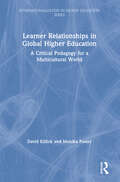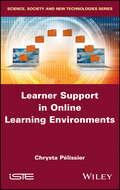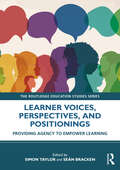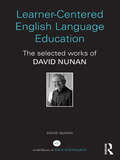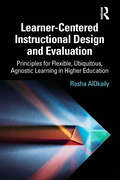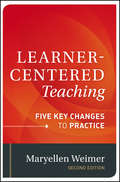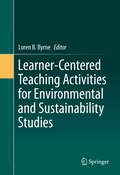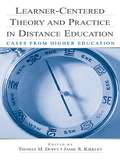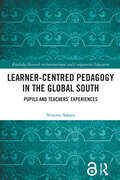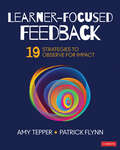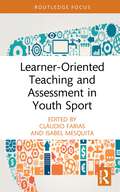- Table View
- List View
Learn to Think: Basic Exercises in the Core Thinking Skills for Ages 6-11
by John LangrehrClassroom questions have traditionally focussed on testing the recall, understanding and application of content and methods. Research suggests that pupils require activities that encourage them to think flexibly about possibilities and to make independent judgements about information. Learn to Think takes a cross-curriculum approach and offers a wide range of exercises in all significant thinking skills areas: Organisational Analytical Evaluative Creative Predicting, categorisation, ordering, generalising, problem solving, summarising, analysis, making distinctions, decision making, cause and evidence are among the skills developed. This book introduces the basic core thinking processes used to connect and make sense of information through a range of skill based sections which provide the basis of a thinking skills programme for pupils. It is complete with introductory notes and examples, pupil work sheets, suggested answers and further useful questions. The resources are fully photocopiable and are suitable for 6 -11 year olds.
Learn to Watercolor: The Essential Techniques in 10 Projects
by Sarah Van Der LindenLearn to watercolor paint in 10 easy steps! Get inspired with gentle and serene watercolor painting as your next calming hobby. Learn the foundational skills of watercolor painting with various techniques that will leave you feeling confident in your skills. The watercolors explained in this book achieve two essential objectives: to immediately enjoy painting and acquiring a solid foundation. Master the basics through 10 gorgeous watercolor projects. With each project, you will learn one to three new techniques. Your confidence and inspiration will grow with each stroke of the brush! Learn the foundational skills of watercolor painting while completing 10 easy display-worthy projects Master these basic techniques: painting a perfect gradient, controlling the fusion of colors, playing with the wetness of the paper, creating various textures, and more Paint plants and flowers with watercolors using this easy step-by-step visual guide
Learn, Lead, Serve: A Civic Life
by Thomas EhrlichThomas Ehrlich served in the federal administrations of six presidents, beginning with Kennedy in 1962. He was also Dean of Stanford Law School, Provost of the University of Pennsylvania, President of Indiana University, and one of the pioneers of the service-learning movement. Weaving together memorable family stories and valuable professional insights, Ehrlich tells how he developed the knowledge and skills to be a leader in both government and higher education, the lessons he learned in those roles, and the many ways he and his wife Ellen balanced family life and civic service along the way. Warmly written and brimming with fascinating, behind-the-scenes details, Learn, Lead, Serve is both a celebration of an accomplished career and an inspiring lodestar for those wanting to follow the path of public service.
Learner Autonomy and CALL Environments (Routledge Studies in Computer Assisted Language Learning #Vol. 3)
by Klaus SchwienhorstThis volume brings together two prominent strands in second language acquisition theory and research: the concept of learner autonomy and computer-assisted language learning (CALL). Learner autonomy supports learners in becoming more reflective and communicative and in experimenting with language and language learning. CALL environments offer more and qualitatively different opportunities for learner autonomy than the traditional language classroom. This book offers researchers a starting point into researching learner autonomy in CALL contexts and offers teachers practical advice on chances and pitfalls in realizing learner autonomy goals in the CALL-supported classroom.
Learner Choice, Learner Voice: A Teacher’s Guide to Promoting Agency in the Classroom
by Ian Jukes Ryan L Schaaf Becky ZayasLearner Choice, Learner Voice offers fresh, forward-thinking supports for teachers creating an empowered, student-centered classroom. Learner agency is a major topic in today’s schools, but what does it mean in practice, and how do these practices give students skills and opportunities they will need to thrive as citizens, parents, and workers in our ever-shifting climate? Showcasing authentic activities and classrooms, this book is full of diverse instructional experiences that will motivate your students to take an agile, adaptable role in their own learning. This wealth of pedagogical ideas – from specific to open-ended, low-tech to digital, self-expressive to collaborative, creative to critical – will help you discover the transformative effects of providing students with ownership, agency, and choice in their learning journeys.
Learner Corpora: Construction and Explorations in Chinese and Related Languages (Chinese Language Learning Sciences)
by Hongyin Tao Howard Hao-Jan Chen Keiko MochizukiThis edited book reflects the state of the art in learner corpus and related approaches to Chinese as a second language (CSL). CSL as a field has flourished in the past few decades due to the increasingly important role of the Chinese language at the world stage, yet studies of Chinese as a second language based on learner corpora have been less well developed due to the limited availability of data and lack of theoretical insights. This book represents the latest research in this area by 1) assembling a large group of active researchers from multiple international research communities (USA, China, Hong Kong, Macau, Japan, Taiwan, and France); 2) discussing the latest resources and technologies in Chinese and other Asian languages learner corpora and corpus building; 3) basing Chinese as a second language studies on data from learners of Chinese with a wide range of first language backgrounds (English, Japanese, Korean, French, among others); and 4) integrating corpus methods with a wide range of related methods in allied fields—language acquisition, usage-based linguistics, psycholinguistics, and neurolinguistics. This comprehensive collection is indispensable for anyone who is interested in corpus approaches to CSL and Chinese applied language studies in general.
Learner Engagement in Online Second Language Classrooms
by Phung DaoThis book explores current research on online instructed L2 acquisition, with a specific focus on the nature and impact of learner engagement in online L2 classroom interaction. It examines the topic of online learner engagement from various theoretical perspectives, discusses conceptual and methodological issues, synthesizes research on the role of learner engagement in online L2 classroom interaction, and critically assesses its connection to teaching practices across different L2 settings. The book is intended for a wide audience, including undergraduate and postgraduate Applied Linguistics, TESOL and Second Language Education students seeking to understand the significance of learner engagement in online L2 learning. It will also be useful for researchers interested in staying updated on recent findings regarding the benefits of learner engagement in online classroom interaction for L2 learning. Additionally, teachers, teacher trainers and educators in Teacher Education (TE) and/or continuous professional development (CPD) programs can benefit from the pedagogical insights offered in this book regarding online L2 instruction in various contexts.
Learner English: A Teacher's Guide to Interference and Other Problems
by Michael Swan Bernard SmithThis updated edition is a practical reference guide which compares the relevant features of a student's own language with English, helping teachers to predict and understand the problems their students have. Learner English has chapters focusing on major problems of pronunciation, grammar, vocabulary and other errors as well as new chapters covering Korean, Malay/Indonesian and Polish language backgrounds.
Learner Interactions in Massive Private Online Courses
by Gang Cheng Di SunBy employing learning analytics methodology and big data in Learning Management Systems (LMSs), this volume conducts data-driven research to identify and compare learner interaction patterns in Massive Private Online Courses (MPOCs). The uncertainties about the temporal and sequential patterns of online interaction, and the lack of specific knowledge and methods to investigate details of LMSs' dynamic interaction traces have affected the improvement of online learning effectiveness. While most research focuses on Massive Open Online Courses (MOOCs), little is investigating the learners’ interaction behaviors in MPOCs. This book attempts to fill in the gaps by including research in the past decades, big data in education presenting micro-level interaction traces, analytics-based learner interaction in massive private open courses, and a case study. Aiming to bring greater efficiency and deeper engagement to individual learners, instructors, and administrators, the title provides a reference to those who need to evaluate their learning and teaching strategies in online learning. It will be particularly useful to students and researchers in the field of Education.
Learner Managed Learning: Practice, Theory and Policy
by Norman GravesA collection of essays presenting the many issues and themes related to self-directed learning, which uses case studies and references to demonstrate that the learner-directed approach is a key ingredient for organizational and personal growth and development.
Learner Narratives of Translingual Identities: A Multimodal Approach to Exploring Language Learning Histories
by Patrick KiernanThis book addresses translingual identities through an innovative multimodal analysis of the language learning histories of a class of advanced learners of English in Japan who grew up between two or more languages. The author explores both the translingual experiences of those in the classroom and how they use language and gesture when describing their experiences to each other. This approach uses three perspectives: it looks at the worlds and identities the interviewees construct for themselves; at their interpersonal communication; and at the way they frame their experience. Finally, it offers some lessons based on the observations of the class which reveal the values they share and the key to their success as language learners. It will appeal to applied linguistic and educational researchers, particularly those with an interest in narrative approaches to exploring educational contexts, as well as language educators and policy makers interested in gaining a learner perspective on language learning.
Learner Relationships in Global Higher Education: A Critical Pedagogy for a Multicultural World (Internationalization in Higher Education Series)
by David Killick Monika FosterProviding the academic community with a robust and highly practical insight into the importance of implementing relationship building into the learning environment and experiences of all students, underpinned by current research, this innovative volume explores intercultural learning and critical pedagogy in the borderless university. By revealing cutting-edge theoretical perspectives and practice which can facilitate critical connections between diverse students, their learning, curriculum, each other, and their communities, Learner Relationships in Global Higher Education integrates academic and student perspectives on relationship development into academic practice. Drawing upon case studies and examples of good practice from across the globe, this book illustrates how practitioners in diverse contexts are designing student experiences in face-to-face and online contexts on- and off-campus to advance learner relationships. By situating this work in a critical pedagogy perspective, the book advances internationalisation in and for a global and multicultural world. In the changing contexts of global higher education, this book is a valuable tool for higher education researchers and practitioners at all stages of their careers.
Learner Voices, Perspectives, and Positionings: Providing Agency to Empower Learning (The Routledge Education Studies Series)
by Simon Taylor Seán BrackenThis book explores the multifaceted concept of learner voice in education, emphasising its significance across various contexts and historical periods. It brings together diverse perspectives from multiple authors, addressing how learner agency can shape educational practices and policies, particularly in contemporary settings.The chapters delve into critical themes such as the influence of teachers' beliefs on student learning, the impact of polarisation in our current educational discourse and the historical voices of children in Victorian schools. Notable case studies include a narrative approach to understanding higher education students' experiences and the examination of learner voice within prison education. The book also addresses pressing issues such as the representation of marginalised voices and the importance of inclusive practices in school leadership and curriculum design. Groundbreaking content includes discussions on "epistemic violence", highlighting the need for a more nuanced, considered and critically aware approach to learner representation.This important collection will be essential reading for educational studies students and trainee teachers, as well as educators working in further or higher education. It provides practical insights and theoretical frameworks that constitute a roadmap for strengthening diverse learners’ voice and agency, thereby advancing educational equity and inclusion for all.
Learner-Centered English Language Education: The Selected Works of David Nunan
by David NunanThis carefully crafted collection provides a snapshot of the evolution of David Nunan‘s theoretical and empirical contributions to the field of second language education over the last 40 years. The volume focuses on the development of his work on second language curricula, and in particular, the work for which he is best known: learner-centered education and task-based learning and teaching. David Nunan has been a language teacher, researcher and consultant for 40 years. He has lived and worked in many countries, principally in the Asia-Pacific region, but also in the Americas, Europe and the Middle-East. In addition to his research and scholarly work, he is the author of several major textbook series for the teaching and learning of English as a foreign Language. These texts are based on his task-based language teaching approach, and are widely used in schools, school systems and universities around the world.
Learner-Centered Instructional Design and Evaluation: Principles for Flexible, Ubiquitous, Agnostic Learning in Higher Education
by Rasha AlOkailyLearner-Centered Instructional Design and Evaluation offers a forward-thinking, evidence-based vision of technology-enhanced higher education that taps into today’s digital access opportunities for more dynamic, agnostic, and inclusive learning experiences. The recent ubiquity of digital devices has fostered a new generation of learners who are technologically adept, engage in rapid social co-construction of knowledge, and expect increased choice and personalisation of educational content and environment. Colleges and universities, however, continue to apply their technology tools into outdated, passive pedagogies. Based on theory and empirical research, this book’s innovative framework guides scholars and practitioners toward instructional design and evaluation approaches that leverage the anytime-anywhere potential of wireless networked devices to foster flexible learning experiences and device-neutral assignments. Each chapter is rich with designs, deliveries, and evaluations of lesson plans, projects, and other real-world course works exemplifying the procedures and principles that will rejuvenate learning amid the globalisation, commodification, and massification of higher education.
Learner-Centered Leadership: Research, Policy, and Practice (Topics In Educational Leadership Ser.)
by Arnold B. Danzig, Kathryn M. Borman, Bruce A. Jones and William F. WrightMany new approaches to school improvement are being proposed in the current climate of assessment and school accountability. This book explores one of these approaches, a new model of leadership training known as Learner-Centered Leadership (LCL). It is built around the fundamental idea that learning and learning communities are natural processes that, when properly harnessed, can lead to the highest levels of professional engagement and problem solving. Key features of this exciting new approach to school leadership include the following: Broad-based and Generative—The book’s narratives vividly illustrate the extraordinary ability of LCL to generate new approaches to leadership development. For example, encouraging and assisting school leaders to reflect on their own leadership attributes relative to the implementation of the school mission to ensure high teacher efficacy and student learning. In this respect the volume contributes significantly to the field of school leadership and professional development by extending above and beyond a narrow focus on instructional leadership. Practice Oriented—By creating communities that encourage conversation and analysis the new data-driven models of school improvement are more likely to be successfully implemented. Without analytical discourse, the process of interpreting school data and transforming it into practice would be largely lost. Conceptually Appropriate—The realization that everyone within a school (students, teachers, administrators) belongs to the same learning community minimizes status differences and encourages teamwork. The LCL administrator is much less likely to be authoritarian and power-oriented and much more likely to be transformative and student outcome focused. This book is appropriate for master’s level courses and certification seminars, and for inservice workshops dealing with school leadership.
Learner-Centered Teaching
by Maryellen WeimerIn this new edition of the classic work, one of the nation's most highly regarded authorities on effective college teaching offers a comprehensive introduction to the topic of learner-centered teaching in the college and university classroom, including the most up-to-date examples of practice in action from a variety of disciplines, an entirely new chapter on the research support for learner-centered approaches, and a more in-depth discussion of how students' developmental issues impact the effectiveness of learner-centered teaching. Learner-Centered Teaching shows how to tie teaching and curriculum to the process and objectives of learning rather than to the content delivery alone.
Learner-Centered Teaching Activities for Environmental and Sustainability Studies
by Loren B. ByrneLearner-centered teaching is apedagogical approach that emphasizes the roles of students as participants inand drivers of their own learning. Learner-centered teaching activities gobeyond traditional lecturing by helping students construct their ownunderstanding of information, develop skills via hands-on engagement, andencourage personal reflection through metacognitive tasks. In addition,learner-centered classroom approaches may challenge students' preconceivednotions and expand their thinking by confronting them with thought-provokingstatements, tasks or scenarios that cause them to pay closer attention andcognitively "see" a topic from new perspectives. Many types of pedagogy fallunder the umbrella of learner-centered teaching including laboratory work,group discussions, service and project-based learning, and student-ledresearch, among others. Unfortunately, it is often not possible to use some ofthese valuable methods in all course situations given constraints of money,space, instructor expertise, class-meeting and instructor preparation time, andthe availability of prepared lesson plans and material. Thus, a major challengefor many instructors is how to integrate learner-centered activities widelyinto their courses. The broad goal of this volume is to helpadvance environmental education practices that help increase students'environmental literacy. Having a diverse collection of learner-centeredteaching activities is especially useful for helping students develop theirenvironmental literacy because such approaches can help them connect morepersonally with the material thus increasing the chances for altering theaffective and behavioral dimensions of their environmental literacy. Thisvolume differentiates itself from others by providing a unique and diversecollection of classroom activities that can help students develop theirknowledge, skills and personal views about many contemporary environmental andsustainability issues.
Learner-Centered Teaching: Putting the Research on Learning into Practice
by Terry DoyleThis book presents the research-based case that Learner Centered Teaching (LCT) offers the best means to optimize student learning in college, and offers examples and ideas for putting it into practice, as well the underlying rationale. It also starts from the premise that many faculty are much closer to being learner centered teachers than they think, but don’t have the full conceptual understanding of the process to achieve its full impact. There is sometimes a gap between what we would like to achieve in our teaching and the knowledge and strategies needed to make it happen.LCT keeps all of the good features of a teacher-centered approach and applies them in ways that are in better harmony with how our brains learn. It, for instance, embraces the teacher as expert as well as the appropriate use of lecture, while also offering new, effective ways to replace practices that don’t optimizing student learning. Neuroscience, biology and cognitive science research have made it clear that it is the one who does the work who does the learning. Many faculty do too much of the work for their students, which results in diminished student learning. To enable faculty to navigate this shift, Terry Doyle presents an LCT-based approach to course design that draws on current brain research on cognition and learning; on addressing the affective concerns of students; on proven approaches to improve student’s comprehension and recall; on transitioning from “teller of knowledge” to a “facilitator of learning”; on the design of authentic assessment strategies – such as engaging students in learning experiences that model the real world work they will be asked to do when they graduate; and on successful communication techniques.The presentation is informed by the questions and concerns raised by faculty from over sixty colleges with whom Terry Doyle has worked; and on the response from an equal number of regional, national and international conferences at which he has presented on topics related to LCT.
Learner-Centered Theory and Practice in Distance Education: Cases From Higher Education
by Thomas M. Duffy Jamie R. KirkleyLearner-Centered Theory and Practice in Distance Education: Cases From Higher Education brings the voice of the learning sciences to the study and design of distance learning. The contributors examine critical issues in the design of theoretically and pedagogically based distance education programs. Eight distance education programs are described in enough detail to allow readers with different interests to understand the pedagogical approaches and the implications of implementing those approaches. Issues of theory, pedagogy, design, assessment, communities of practice, collaboration, and faculty development are discussed.Each section of the book includes: *a primary chapter written by an author or authors involved with a distance education program that reflects learner-centered principles;*a formal reaction to the chapter by a specialist from the learning sciences, educational evaluation and policy, administration, or the corporate sector with expertise in issues of distance learning; and *an edited transcript of the authors' discussion of the primary chapter held at a symposium at the Asilomar Conference Center. A final "summing up" section offers two perspectives--from leading scholars outside the fields of instructional design, evaluation, and the learning sciences--on the approaches and thinking reflected in the rest of the book. This book is essential for researchers, as well as all those engaged in delivering, supporting, or administrating distance education programs at the post-secondary level. The descriptions, strategies, and principles will inform the design of continuing education, as well as degree-based education and corporate education and training, and distance education programs for adults.
Learner-Centred Pedagogy in the Global South: Pupils and Teachers’ Experiences (Routledge Research in International and Comparative Education)
by Nozomi SakataLearner-Centred Pedagogy in the Global South: Pupils and Teachers’ Experiences shines light on learner-centred pedagogy (LCP), which has gained popularity within global and national governments, albeit resulting in puzzling and inconsequential appropriation. Nozomi Sakata draws on award-winning research on learner centred pedagogy conducted in Tanzania that looks to shift the focus from teachers and teaching to students and learning. The recent spread of LCP through global policy discourse meets Tanzania’s historical and contemporary (in)compatibility in local schools. The book explores how pupils’ perceived classroom experiences are formed through pedagogical elements beyond the classroom. It also enquires into how observable LCP activities and/or pupils’ perceptions of classroom practices relate to their academic performance and learning attitudes. The book highlights the multidimensionality of pedagogy and the need to consider multiple viewpoints from both teachers and pupils and to consider the historical and socio-cultural contexts in any pedagogical research. This book will be of value to researchers and students interested in pedagogy, policy transfer and education reforms in the global South. The Chapters 5, 6 and 8 of this book are available for free in PDF format as Open Access from the individual product page at www.routledge.com. It has been made available under a Creative Commons Attribution-Non Commercial-No Derivatives 4.0 license.
Learner-Focused Feedback: 19 Strategies to Observe for Impact
by Amy Tepper Patrick W. FlynnNew strategies for feedback that supports a culture of learning The skill set required for observing why students are learning and how teachers influence that is a difficult one to master—yet it’s essential when it comes to driving change and growth in your school. This companion to Feedback to Feed Forward provides a curated collection of strategies to improve your ability to identify desired outcomes, recognize learning in action, collect relevant and accurate evidence, and develop smart, supportive, and effective feedback about a teacher’s impact on learners. And it’s not just leaders, coaches, and administrators who can use this highly accessible how-to. This time around, Tepper and Flynn also address the needs of teachers who double as observers, whether they’re mentoring new teachers, supporting each other or analyzing the effectiveness of their own teaching. No matter your role, you’ll benefit from their expert guidance, as well as: · Authentic classroom examples · Observer think-alouds · Stories from the field with "Give-It-a-Try" tools and "Stop and Think" questions · Follow-up steps specific to your role When classroom observation and feedback are both learner-centered (focused on students) and learning-focused (focused on teachers as learners), they lead to a culture of learning throughout the school. Take this book as your guide, and explore just how effective your feedback can be. Learner-Focused Feedback has been recognized for focusing on practices that have high effect sizes and will help you translate the groundbreaking Visible Learning research into practice. When educators use strategies that have high effects (greater than 0.40), they can accelerate student achievement. The power of the Visible Learning research lies in helping educators understand which factors have the highest impact on student achievement so that educators can begin making strategic decisions based on evidence that will utilize their time, energy, and resources to the best extent possible. The Visible Learning research is based on Professor John Hattie’s unmatched meta-analysis of more than 1,600 research reviews comprising 95,000 studies, involving more than 300 million students—the world’s largest evidence base on what works best in schools to improve student learning. From that research, Dr. Hattie identified more than 250 factors that have an impact on student achievement. View a full list of
Learner-Focused Feedback: 19 Strategies to Observe for Impact
by Amy Tepper Patrick W. FlynnNew strategies for feedback that supports a culture of learning The skill set required for observing why students are learning and how teachers influence that is a difficult one to master—yet it’s essential when it comes to driving change and growth in your school. This companion to Feedback to Feed Forward provides a curated collection of strategies to improve your ability to identify desired outcomes, recognize learning in action, collect relevant and accurate evidence, and develop smart, supportive, and effective feedback about a teacher’s impact on learners. And it’s not just leaders, coaches, and administrators who can use this highly accessible how-to. This time around, Tepper and Flynn also address the needs of teachers who double as observers, whether they’re mentoring new teachers, supporting each other or analyzing the effectiveness of their own teaching. No matter your role, you’ll benefit from their expert guidance, as well as: · Authentic classroom examples · Observer think-alouds · Stories from the field with "Give-It-a-Try" tools and "Stop and Think" questions · Follow-up steps specific to your role When classroom observation and feedback are both learner-centered (focused on students) and learning-focused (focused on teachers as learners), they lead to a culture of learning throughout the school. Take this book as your guide, and explore just how effective your feedback can be. Learner-Focused Feedback has been recognized for focusing on practices that have high effect sizes and will help you translate the groundbreaking Visible Learning research into practice. When educators use strategies that have high effects (greater than 0.40), they can accelerate student achievement. The power of the Visible Learning research lies in helping educators understand which factors have the highest impact on student achievement so that educators can begin making strategic decisions based on evidence that will utilize their time, energy, and resources to the best extent possible. The Visible Learning research is based on Professor John Hattie’s unmatched meta-analysis of more than 1,600 research reviews comprising 95,000 studies, involving more than 300 million students—the world’s largest evidence base on what works best in schools to improve student learning. From that research, Dr. Hattie identified more than 250 factors that have an impact on student achievement. View a full list of
Learner-Oriented Teaching and Assessment in Youth Sport (Routledge Focus on Sport Pedagogy)
by Cláudio FariasThis book provides sport educators with a comprehensive, learner-centred instructional toolkit to empower children and young people in collaborative, independent learning of sport and games (SGs). The book is unique in bringing together the various pedagogical dimensions inherent to the teaching-learning process of SGs: the instructional system (teaching strategies), the social system (interactional climate), the task system (learning tasks and activities), and the assessment (for learning) system. It also shows how to effectively involve learners as active agents in promoting more democratic learning environments and equitable interactions between sportspersons. Written by a team of experts with extensive experience of using student-centred approaches as teachers, youth coaches, teacher educators, researchers, and theorists, the book introduces key concepts and evidence-based examples of best practice, with practical instructional strategies, learning tasks, and activities included in every chapter. As the chapters of the book unfold, they teach the reader how to create game-based tasks that are suited to different learner skill levels, how to align tasks, learning goals and learner needs, and feel empowered to engage young people in creativity development activities. Covering key themes in contemporary sport pedagogy from the constraints-led approach and appropriateness to learner-designed games and the use of technology, this is essential reading for all trainee and in-service physical education teachers and sports coaches working with children or young people.

